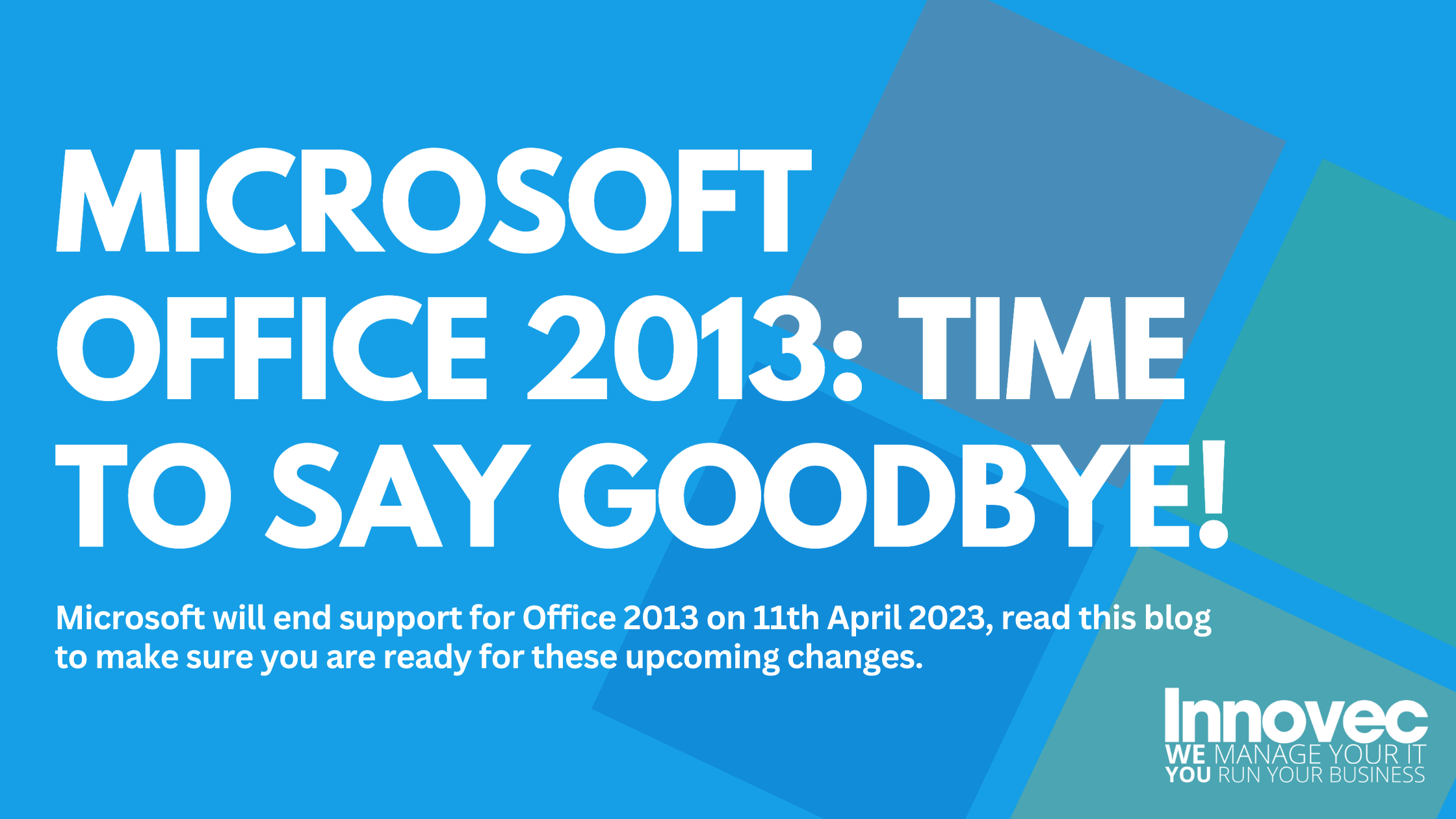
Microsoft Office 2013: Time to Say Goodbye!
Microsoft has announced that it will be discontinuing support for Office 2013, one of its most popular productivity suites, as of 11th April 2023.
While this may not seem like a pressing issue, it’s crucial to understand why this is happening, the effects it may have on your business, and the options available to you to ensure the continued security and stability of your IT infrastructure. In this blog, we take a closer look at:
- Why is Microsoft Stopping Support for Office 2013
- What Does This Mean for Office Users?
- What’s Next for Office Users?
Why is Microsoft Stopping Support for Office 2013?
The main reason Microsoft is discontinuing support for Office 2013 is that the suite is getting old. Microsoft, like most major software vendors, support their flagship products for a long time until the evolution of technology, use cases and user expectations mean it is more effective and efficient to focus on enhancing new technologies as opposed to continually working to evolve older existing solutions.
Historically, Microsoft has provided support for its Office products for roughly 10 years. As Office 2013 was first released in January 2013, it is nearing the end of its support life cycle, and Microsoft is looking to focus its resources on newer, arguably better, products.
Microsoft also wants to encourage users to upgrade to a newer version of Office, such as Office 2016, Office 2019, and Office 2021 or to Microsoft 365.
A nice reference to remind you how far tech has evolved in the last 10 years…Netflix only launched its streaming service in the UK in 2012 and now we can’t board a train or a bus without half the passengers watching the latest episode on their phone. So, think back to where you were as a user, and a business a year after Netflix launched compared to where you, your team and your clients are now.
These newer versions of Office offer more features and functionalities than Office 2013 and Microsoft 365 is much better suited for the modern workplace as it is based in the cloud – meaning your team can access what they need to from anywhere.
What Does This Mean for Office Users?
For users who are still using Office 2013, the discontinuation of support means that they will no longer receive security updates, bug fixes, and technical support from Microsoft. This can be a significant problem for businesses that rely heavily on Office 2013 to run their operations, as it leaves them vulnerable to security threats and potential downtime.
Users can continue to use Office 2013 after support ends but may also experience compatibility issues with other software and services. This is because newer software and services are designed to work with newer versions of Office and may not be fully compatible with Office 2013. This means although Office 2013 will still work in theory, it may become frustrating for your team to use as other services within the business don’t work the way they should.
What’s Next for Office Users?
If you are a business owner who is currently using Office 2013, there are several actions you can take to prepare for the discontinuation of support.
Upgrade your Office Suite
The first and most obvious action is to upgrade to a newer version of Office. This can be either Office 2016, Office 2019 or Office 2021.
Upgrading to a newer version of Office involves some additional costs, such as purchasing new licenses and possibly training your staff on how to use the new software. However, the benefits of upgrading, such as improved security and better functionality, as well as what Microsoft would consider a better product, means this is an investment worth making to help your team continue to work at their best.
Upgrade to Microsoft 365
This means that you can access your documents and data from anywhere, as long as you have an internet connection. As well as this, the software automatically updates, meaning you won’t face the same situation you are in right now where you need to consider a completely new product.
The other option you can take is to migrate to a cloud-based productivity suite, such as Microsoft 365. This is what we would recommend to anyone currently using Office 2013 as Microsoft 365 offers similar functionalities to Office, but is hosted in the cloud and does not require any local installation to maintain and upgrade.
Microsoft 365 works on a subscription-per-user basis, making it easy to scale how many licenses your business needs as you grow. Innovec has implemented Microsoft 365 for hundreds of Businesses across Scotland, to find out more, click here to read our recent customer stories about Microsoft 365 implementation.
Microsoft’s decision to discontinue support for Office 2013 is a reminder that software and technology usually carries a limited lifespan, and it is important that businesses stay up to date with the latest technologies to make sure they stay secure and productive.
If you are an Office 2013 user, click here to contact us and one of our expert team will be in touch to discuss your options further.
